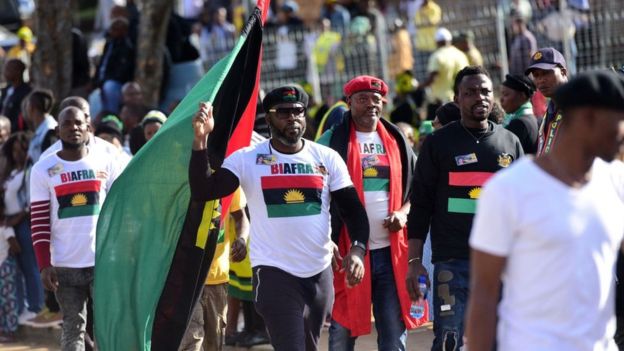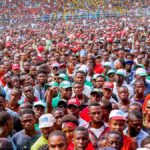Eyewitness accounts of events of early hours of Monday in Owerri revealed a well-planned, full-scale assault on the Nigerian state. Heavily armed men with AK-47 rifles, machine guns and explosives set free over 1,800 inmates and burnt dozens of vehicles as their attempts on a police armoury and to break into the government house were foiled. A city relishing the serene Easter air was turned into a war zone. This coordinated operation is a huge red flag of an impending catastrophe that should send nervous shock across the country. Igbo elders and every well-meaning Nigerians must do everything possible to avert another civil war or a new Boko Haram from unfolding.
The outlawed Indigenous People of Biafra (IPOB), which was fingered by the Inspector General of Police, denied responsibility, but its fugitive leader gave it away. Even before most people had learnt of the attack, Nnamdi Kanu was hailing and justifying the attack on Twitter, along with his followers. He claimed that if bandits and Boko Haram are granted amnesty, “then no single soul deserves to be in any prison in Nigeria”. Kanu’s sarcastic conclusion “If you know you know” and his use of the usual hashtag #UGM (meaning Unknown Gunmen) look to me like a coded claim of responsibility.
From last December when Kanu, who broke bail in 2018 while standing trial for treason, proclaimed the formation of the IPOB’s militia grandiosely named the Eastern Security Network, we have witnessed consistent targeting of police stations, checkpoints and other government posts. At least 34 police officers have been killed across the South East and seven police stations razed in about 40 attacks in the last four months. Along with security operatives, dozens of members of the minority Hausa-Fulani community in the South East, whom Kanu habitually vilifies and against whom he encourages attacks, have been killed and their businesses looted. In fact, fighting “Fulani terrorism” and “state sponsored lawlessness” is, according to Kanu, the primary aim of his militia.
This is reminiscent of the early days of Boko Haram. After a spate of attacks on police stations across the North East, and assassinations of security officers and individuals viewed as enemies throughout 2010, Boko Haram launched its first major attack on Bauchi prison where it freed about 720 prisoners including 150 group members on September 7 of that year. This was the beginning of the escalation a conflict that is still is ongoing, and to date has killed a conservative estimate of 50,000 people, displaced millions and triggered an unprecedented humanitarian crisis.
IPoB is clearly reading Boko Haram’s playbook. It is reported to have stolen caches of weapons in its previous attacks on smaller security units. Having built enough capacity, it felt ready to face bigger units in Monday’s attacks. It is reported that dozens of freed inmates joined the attackers, singing the group’s anthem – further pointing to IPoB responsibility. These assaults don’t aim for outright victory; rather, they are intended to gradually debilitate security forces so that members can operate more freely in the coming months.
If the group continues to emulate Boko Haram and similar groups, we can expect banks to be the next set of victims, with the aim of stealing cash. This is what happened in the initial period of Boko Haram’s insurgency, when its fighters operated more easily in cities. Dozens of fighters would typically force entry into a bank and force the manager to open the vault, which they would empty, before leaving the scene whilst opening fire and killing police and civilians. For example, in September 2011, Boko Haram fighters stormed a bank in Misau, Bauchi State, killing six people and taking NGN 19,200,000 razing a police station as they left. They also carted N9,000,000 off from a bank in Damaturu, the capital of Yobe State, in April 2013. It is difficult to verify through open sources the total amount amassed by Boko Haram through bank attacks, but the above examples indicate that it could have stolen hundreds of millions. With stolen weapons and cash, Boko Haram was positioned to unleash the mayhem that followed.
Given this example, the apparent complacency of south-easterners is naïve and dangerous. Several news outlets reported that a sizeable number of Owerri residents were jubilant at the attack. This is may not necessarily be because they support IpoB, but perhaps because of the unpopularity of police, thanks to endemic corruption and impunity. The same atmosphere festered in the northeast when Boko Haram started. Maiduguri residents, and the North East, largely didn’t see Boko Haram as a personal threat. Rather, they were seen in some quarters as heroes and freedom fighters, like a modern-day Robin Hood. But as the crisis escalated, attacks became more brutal and indiscriminate, and residents became a soft target. By the time the North East smelt the coffee, it was too late.
Some Igbo commentators sound too confident that their home is immune from the North East’s disease. They claim different circumstances. One such claim is that IPOB is not driven by a religious ideology, which is true – but the reality is that the ideology of terror does not have to be religious. All you need is some sort of ethno-political ideology, which is exactly what drives IPoB. History has recorded too many groups that became violent because of secular ideologies. A textbook example is right at home: the horrific Nigerian civil war didn’t need religious ideology on either side.
Some said the Igbo will never kill each other, which is exactly what my fellow Kanuri thought when Boko Haram started. Today, we are by far the greatest victims of our fellow tribesmen, former friends and mates. Besides, don’t we read daily in the media of how Igbo, like all other ethnic groups, are betraying, cheating on and killing one another. Perhaps, they are comforted by the fact that the militia presently spares them, which is exactly what Boko Haram fighters did in their early days. What they don’t seem to understand is that violence is a dangerous drug; what starts off sparing civilians rarely stays that way.
If the situation in the South East deteriorates, even if IPoB does not target ordinary citizens, they will be the victims. With an atmosphere of fear and apprehension created, and restrictions of freedoms occasioned by government countermeasures, the first area to take a hit will be the economy. Businesses, industries and offices will close, and commercial activities will be grounded. Governors will declare curfews. Then the human costs and other consequences will follow. It behoves the political and traditional leaders of the South East to rise against this challenge before it gets too late. They must talk to the minority of their sons who have decided to take up arms. The political marginalisation the Igbo complain of may be well-founded, but violence is not the way to change the story. Political involvement and building bridges is always better than shedding blood and erecting barriers.
It was Otto von Bismarck, the great politician and diplomat who unified Germany, who said, “Fools learn from experience. I prefer to learn from the experience of others.” Igbo are reputed for their sagacity. As an ardent fan of Igbo traditional movies, I can attest to this even from their rich culture and apt aphorisms. I urge Igbo elders to put this to good use to avoid the catastrophe that befell the Northeast.

 Join Daily Trust WhatsApp Community For Quick Access To News and Happenings Around You.
Join Daily Trust WhatsApp Community For Quick Access To News and Happenings Around You.


